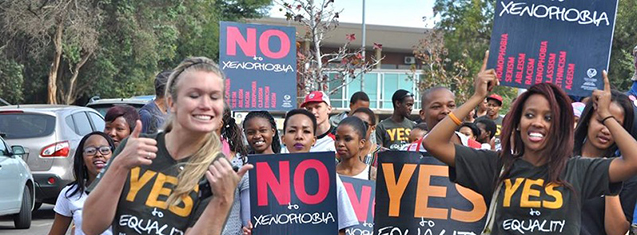
In light of the recent violent attacks on foreigners in South Africa, the University of the Free State’s (UFS) Human Rights Desk hosted a symposium on the issue of xenophobia on Wednesday 29 April 2015 on the Bloemfontein Campus. In collaboration with volunteers from the Institute of Reconciliation and Social Justice (IRSJ), students had the opportunity to discuss the underlying issues of the problem.
Joe Besigye, Numpumelelo Ngcobo, Phiwe Mathe, and Dr Christian Williams lead the symposium. The panel aimed at providing guidance, answers, and explanations to the different narratives offered in the wake of the conflict. The underlying reasons for the conflict were investigated, which included socio-economic factors as well as the afrocentric tone of the events. Possible aggravating factors – such as the misplacement of blame and a South African culture of entitlement – also came under scrutiny. In addition, the discussion looked at the need to take into account the perspectives of non-South Africans on African conflicts.
After the symposium, Kovsie students gathered at the Thakaneng Bridge where Vice-Chancellor and Rector, Prof Jonathan Jansen, addressed the group. Carrying posters with ‘No to Xenophobia’ messages, the students then marched across the campus to show their support for anti-xenophobia.
The IRSJ – which the Human Rights Desk forms part of – has spearheaded the No-to-Racism/Yes-to-Equality Campaign launched in March 2015 across all three campuses. Under the guidance of the IRSJ, the Kovsie community has regularly been publicly showing their solidarity against all forms of discrimination.